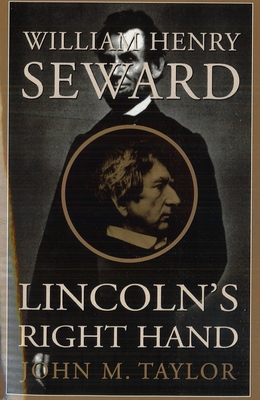William Henry Seward: Lincoln's Right Hand

William Henry Seward: Lincoln's Right Hand
From Kirkus Reviews: A friendly yet not uncritical biography of the secretary of state in the Lincoln and Andrew Johnson Cabinets. Taylor--who chronicled his father's life in General Maxwell Taylor (1987)- -offers neither much original scholarship nor a fresh approach, but writes smoothly and with balance. Why did Seward, front-runner for the 1860 GOP presidential nomination, lose his party's nod to the relatively unknown Lincoln, and why has he been so completely eclipsed by him since? Taylor depicts a politico whose manifold talents were often undermined by his own ambiguity (even Seward admitted that he "found myself an enigma to myself''). Intellectual, shrewd, diligent, convivial, and even charitable toward enemies, Seward was also willing to trim his sails in pursuit of political objectives. Linking up with Albany political boss Thurlow Weed, he worked ably for liberal causes as New York's governor and, later, in the Senate, where he became leader of the antislavery faction. Losing his bid for the Presidency because of his alliance with Weed and his statements about a "higher law'' and "irrepressible conflict'' with the South, Seward later undercut his political base still further by meddling with other Cabinet members' business and clashing with Radical Republicans during the Civil War and Reconstruction. Taylor does not fully explain why Seward muted his opposition to slavery during the secession crisis in the hope of reconciling the South, and fails to criticize Seward's mistakes adequately (e.g., saber-rattling gestures toward England and France that Lincoln rightly rejected). Yet Taylor correctly praises him for keeping the South in diplomatic isolation, bucking up the melancholy Lincoln's spirits, and having the vision to push through the initially scorned Alaska purchase ("Seward's Icebox''). An orthodox but sensible treatment of a dedicated politician-statesman who was sometimes too clever and complex for his own good.
185.69Lei
185.69Lei
Indisponibil
Descrierea produsului
From Kirkus Reviews: A friendly yet not uncritical biography of the secretary of state in the Lincoln and Andrew Johnson Cabinets. Taylor--who chronicled his father's life in General Maxwell Taylor (1987)- -offers neither much original scholarship nor a fresh approach, but writes smoothly and with balance. Why did Seward, front-runner for the 1860 GOP presidential nomination, lose his party's nod to the relatively unknown Lincoln, and why has he been so completely eclipsed by him since? Taylor depicts a politico whose manifold talents were often undermined by his own ambiguity (even Seward admitted that he "found myself an enigma to myself''). Intellectual, shrewd, diligent, convivial, and even charitable toward enemies, Seward was also willing to trim his sails in pursuit of political objectives. Linking up with Albany political boss Thurlow Weed, he worked ably for liberal causes as New York's governor and, later, in the Senate, where he became leader of the antislavery faction. Losing his bid for the Presidency because of his alliance with Weed and his statements about a "higher law'' and "irrepressible conflict'' with the South, Seward later undercut his political base still further by meddling with other Cabinet members' business and clashing with Radical Republicans during the Civil War and Reconstruction. Taylor does not fully explain why Seward muted his opposition to slavery during the secession crisis in the hope of reconciling the South, and fails to criticize Seward's mistakes adequately (e.g., saber-rattling gestures toward England and France that Lincoln rightly rejected). Yet Taylor correctly praises him for keeping the South in diplomatic isolation, bucking up the melancholy Lincoln's spirits, and having the vision to push through the initially scorned Alaska purchase ("Seward's Icebox''). An orthodox but sensible treatment of a dedicated politician-statesman who was sometimes too clever and complex for his own good.
Detaliile produsului










